 Every organization involved in refugee resettlement undertakes its work with an eye to local conditions. For Interfaith Refugee and Immigration Services of Los Angeles (IRIS), one of EMM’s affiliates, that means confronting the challenges and the opportunities that come with being in one of the U.S.’s largest metropolitan areas, in a state that has become home to many newcomer communities over the years.
Every organization involved in refugee resettlement undertakes its work with an eye to local conditions. For Interfaith Refugee and Immigration Services of Los Angeles (IRIS), one of EMM’s affiliates, that means confronting the challenges and the opportunities that come with being in one of the U.S.’s largest metropolitan areas, in a state that has become home to many newcomer communities over the years.
Los Angeles is famous for sunny skies, the entertainment industry, and traffic jams. Newly arrived residents, living on a limited budget, may find it daunting and time-consuming to cross the city using public transportation. The shift to digital communications accelerated by the pandemic opened the door to doing some tasks remotely. In time, IRIS staff have found that given their local context, it often works better for them to offer some services online, and for staff to drive to clients’ homes when in-person contact is necessary. But due to these adaptations, staff began to realize that although clients knew individual case managers, IRIS as an organization remained unfamiliar to many. If they didn’t know IRIS, they might not understand all the ways that the organization could help them move through each phase of their new lives in greater Los Angeles.
Hilda Sarkisians, Manager of Refugee Services, recognized the impact that this disconnection was having, and found a way to make IRIS and the range of resources it offers more real to their clients.
As Vice Chair of the Refugee Forum of Los Angeles (RFLA), Hilda had attended many well-intentioned public events. She noticed that some efforts to celebrate the presence and contributions of newcomers, such as World Refugee Day events, had drawn more people representing organizations than those with lived experience of forced displacement. In an effort to ensure that public events attracted newcomers – refugees, asylum seekers, immigrants – and not just “people with resources,” Hilda and several partners decided to join the “Welcoming Week” initiative spearheaded by Welcoming America in mid-September 2024. Together, they designed an event that would draw clients to the IRIS offices, both for a warm welcome and for a long overdue in-person visit.
On September 19, the shaded courtyard of IRIS’s offices was ready to welcome clients and guests.
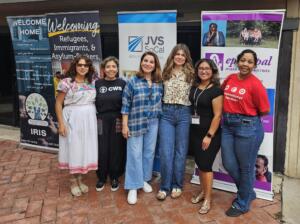
IRIS combined forces with several organizational partners, including RFLA, Coalition for Humane Immigrant Rights of Los Angeles (CHIRLA), Church World Service of Orange County, the American Red Cross, JVS SoCal, the Los Angeles Office of International Affairs, and the Department of Public Social Services of Los Angeles County (DPSS). Each organization had a table where they shared information about their services and offered visitors giveaways. Most significantly, DPSS staff came prepared to enroll new clients eligible for public assistance right there at the event. Hilda Sarkisians was delighted to report that over 60 people, 75% of whom were IRIS clients, were enrolled for benefits, without having to endure complicated commutes or long lines and waits at DPSS offices – another win for efficiency in this massive metropolitan area.
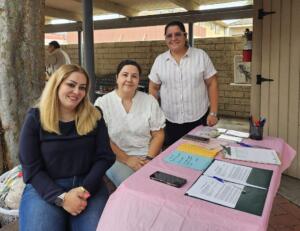
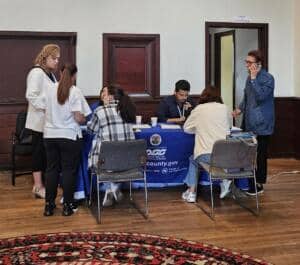
IRIS and its partners had planned an event that would celebrate and delight guests in other ways. There were tables laden with cold drinks and catered food, carefully selected to make sure it would appeal to halal, vegetarian and other dietary concerns of a wide range of guests. There was music playing, colorful strings of lights and balloons, and a space for a client to exhibit her artwork. As guests arrived, they were given a “bingo” card, with prompts such as “find someone who is from Afghanistan.” This led people to strike up conversations with each other, in the quest to “find someone who…” and fill their bingo card.
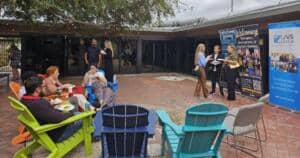

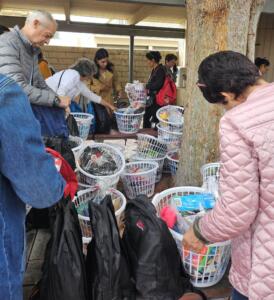
The organizers had also gone out of their way to collect and compose gift baskets for clients, including school supplies and toys for children, personal care and cosmetics items for adults, and non-perishable food for families living on a limited budget. Realizing that even with these enticements, it might be hard for some clients to get to the event, IRIS organized and provided transportation for clients. As these photos indicate, this first-ever welcoming event for IRIS and its partners was a definite success, making it very much “worth the detour” for all attendees.
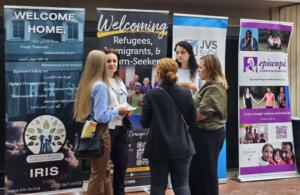
For Hilda Sarkisians and many who work in resettlement agencies across the country, offering welcome is part of their role. But so is advocacy – stepping up to speak to others, especially people in positions to shape laws and policies – about the complex truths of the lives that refugees and other newcomers to the U.S. lead. As Hilda put it,
Our main job is to resettle [newcomers], but at the same time, we are the people who advocate for other refugees, for people who are somewhere else, suffering, being persecuted… With social media nowadays, everyone is aware of lots of things. If you know that someone is talking [on your behalf], it can encourage people to get up and do what they have to do, if they cannot deal with a situation. My job is not only managing the staff and programs, connecting with EMM, monitoring for compliance. If anything is happening, my job is to go and say, ‘I’m here to help you.’ … We do that with Welcoming Week, World Refugee Day, going to rallies, meetings, seeing people who can make a difference — that’s our job!
In late September, after the end of Welcoming Week, Hilda and several of her IRIS colleagues took time to join other advocates at a rally organized in front of the L.A. office of Governor Gavin Newsom.
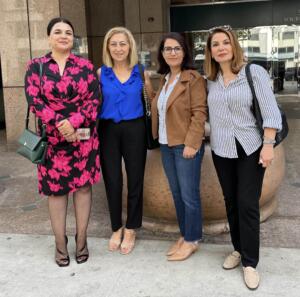
IRIS-LA staff attended a rally in support of SB-85 on September 27, 2024. From left to right: Zhinos Zareh Latif, Susan Mamikonyan, Greta Bazgosha, and Hilda Sarkisians. Also present, not pictured, was Executive Director Troy Elder.
The purpose of the rally was to urge the governor to sign into law a proposal known as SB-85. 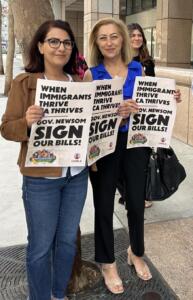 This proposed state law would enable the California Department of Social Services to extend any unused federal funds granted under the “Reception and Placement” program, making funds available to support additional services (for English classes, employment training, and case management) for refugees who still needed such services beyond their initial 90 days in the U.S. California’s state legislature had been considering such a bill since early 2023, and similar laws had already been approved in Colorado, Utah and Oregon.
This proposed state law would enable the California Department of Social Services to extend any unused federal funds granted under the “Reception and Placement” program, making funds available to support additional services (for English classes, employment training, and case management) for refugees who still needed such services beyond their initial 90 days in the U.S. California’s state legislature had been considering such a bill since early 2023, and similar laws had already been approved in Colorado, Utah and Oregon.
Hilda Sarkisians had been involved in advocating for the proposed law since early 2023. As part of a group of advocates, she had given testimony in a hearing before the California assembly in Sacramento. As she explained,
The reason I went there is: I am a refugee, I was a case manager, I know how things work and how short 90 days can be, to get somewhere with clients. So I gave my testimonial in Sacramento. And when I start talking, I talk!
As a former refugee from Iran, Hilda understands well the courage it takes for some people to speak up. But she refuses to let fear get in the way of the need to tell the truth about the conditions that refugees and other newcomers face:
I’m not scared of talking. There was a time when I was scared to talk, because I was embarrassed of my accent. Now I’m not! Because I learned that, “Hey Hilda, having an accent means you know two or three other languages.” So I stopped at that point and said, “Hilda, talk the way you can talk. Just bring the issues and tell people what has happened.” People who make decisions have to know the truth!
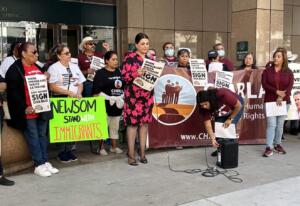 At the rally in front of Gov. Newsom’s office on September 27, Hilda listened and clapped while one of her colleagues, Zhinos Zareh Latif, originally from Afghanistan, and now a case manager for IRIS-LA, spoke. Zhinos highlighted the difference it would make for newly arriving refugees, to have a few more months of support as they learn English, find their bearings in an unfamiliar job market and a new community. Speakers from other organizations such as CHIRLA likewise stepped up to the mic, sharing their testimonies and their arguments in support of the proposed law. The atmosphere was electric with hope as the rally ended and the IRIS team returned to the office.
At the rally in front of Gov. Newsom’s office on September 27, Hilda listened and clapped while one of her colleagues, Zhinos Zareh Latif, originally from Afghanistan, and now a case manager for IRIS-LA, spoke. Zhinos highlighted the difference it would make for newly arriving refugees, to have a few more months of support as they learn English, find their bearings in an unfamiliar job market and a new community. Speakers from other organizations such as CHIRLA likewise stepped up to the mic, sharing their testimonies and their arguments in support of the proposed law. The atmosphere was electric with hope as the rally ended and the IRIS team returned to the office.
The advocates later learned that on September 28, Gov. Newsom decided to veto the bill, citing his commitment to staying within the bounds of a streamlined budget. Hilda was disappointed, but not deterred. She knows that advocates must be in it for the long term. As she said,
Talking is important, it matters — how you deliver the truth. Advocacy is educational for us, for myself, for our staff, it helps us understand. You talk, you share what you know, you learn something. The fact that we did advocacy, that matters. And maybe next year, we will have different results.
* * *
What have you and others been advocating for? How do the conditions and capacities of your local community shape the ways you engage in the work of welcome? We at EMM would love to share your stories! Share your experiences with us by reaching out to Janet Morford (jmorford@episcopalchurch.org) or Kendall Martin (kmartin@episcopalchurch.org) of the EMM Communications Team.



